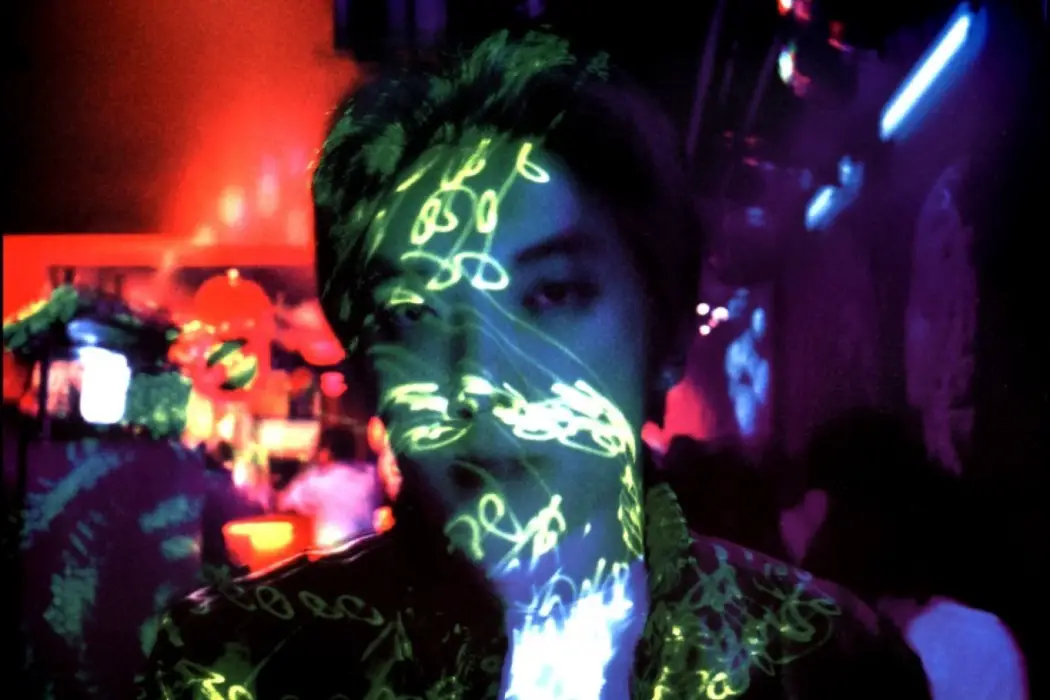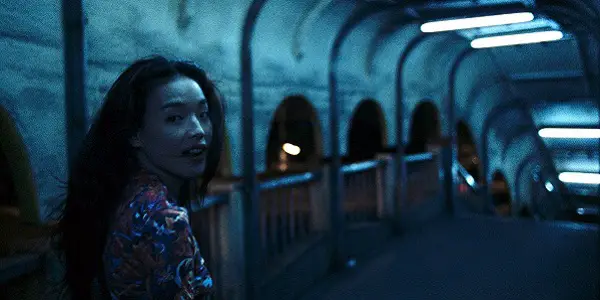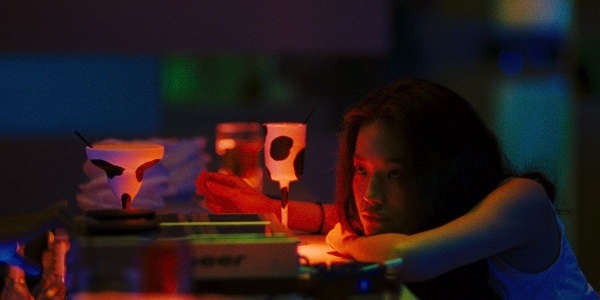MILLENNIUM MAMBO: Dancing With Neon Demons

Lee Jutton has directed short films starring a killer toaster,…
Director Hou Hsiao-hsien’s 2001 film Millennium Mambo is a dizzying, dreamlike depiction of the life and loves of one young woman in Taipei at the turn of the twenty-first century. The film’s almost miraculous opening sequence, in which the camera tracks the beautiful, enigmatic Vicky (Shu Qi) as she runs in slow-motion down a fluorescent-lit tunnel to the softly pulsating beats of Lim Giong’s “A Pure Person,” sets the mood for everything that is to follow. As Vicky looks back on that tumultuous period in her life from ten years in the future, narrating her own flashback in the third person, one cannot help but tumble down the rabbit hole of memory with her. It’s not an easy journey, but it is a worthwhile one — and with a sumptuous new 4K restoration now available from Metrograph Pictures, there’s no better time to take it.
Party Girl
In the year 2001, Vicky’s life revolves around her job as a nightclub hostess and her relationship with Hao-Hao (Tuan Chun-hao), an emotionally and physically abusive loser whose only way of earning money is stealing and pawning his father’s Rolex. While Vicky works long shifts at the club, Hao-Hao practices DJing and hosts drunken parties in their claustrophobic little flat; when they go out and Vicky talks with other people, Hao-Hao accuses them of trying to steal her and starts fights. Their relationship is toxic to the very core, yet like so many other young women who feel that they don’t have any other options, Vicky can’t seem to leave: “Again and again… As if under a spell, or hypnotized… she couldn’t escape. She always came back.”

While working at the club, Vicky meets an older patron named Jack (Jack Kao) who seems to offer her a way out of Hao-Hao’s clutches; the only problem is, he’s a gangster. Still, he treats Vicky the way she deserves to be treated, and gives her the chance to contemplate the idea of a new future — one without Hao-Hao lurking ominously on its edges, ready to rip everything apart.
Taipei Story
Thanks to director Hou and writer Chu T’ien-wen, Millennium Mambo is as accurate a portrayal of the unique mix of exhilaration and ennui that comes with one’s early twenties as I have ever seen on screen. Our heroine is aimless and relatively unambitious; she can’t even imagine herself working in a coffee shop when Jack suggests it. The only time Vicky ever seems to be truly enjoying herself is when she’s dancing under the flickering strobe lights of a nightclub with a lit cigarette dangling from her hand—only then she can let go of her problems and let the music make her decisions for her.
When Vicky is around Hao-Hao and their other friends, she seems old beyond her years; when she comes home from work to find a party going on, she immediately starts cleaning up, picking up cans and emptying ashtrays as she moves around the sprawled-out bodies playing video games on the floor. Yet when she is with Jack and his compatriots, one is struck with the realization that Vicky is still barely more than a child, an immature young woman who gets messy drunk and needs to be escorted safely home. She’s on the precipice of adulthood; it’s just a question of if she can hold on long enough to permanently avoid falling back into endless adolescence with Hao-Hao at her side.

As befits a story told through an extended flashback, there are moments in Millennium Mambo that feel somewhat unclear; the progression of time remains vague and woozy, as though you’ve just woken up with a killer hangover and aren’t sure how long you’ve been passed out. The one constant is Vicky, drifting from scene to scene, exhaling cigarette smoke from under a mop of gloriously tangled black hair. Needless to say, Shu Qi is mesmerizing in the role. It’s all too easy to be enraptured by her screen presence; she demands your attention even in the film’s most difficult scenes, which involve the despicable Hao-Hao trying to force her to do things she doesn’t want to do.
Shu Qi and everyone else in the movie are photographed beautifully by cinematographer Mark Lee Ping-Bing, known for his brilliant work in films like Wong Kar-wai’s In the Mood for Love and Hou’s Flowers of Shanghai. The vibrant Taipei nightlife that serves as Millennium Mambo’s backdrop is captured in bold smears of color, light, and shadow. Cool blues clash with bright yellows and oranges, and whites are very rarely ever seen without a blacklight giving them a strange, surreal glow. Needless to say, my youthful indiscretions never looked as good as Vicky’s do here — nor did they have the benefit of being scored by Lim Giong’s atmospheric electronic tracks.
Conclusion:
It’s impossible to not feel a bit existential after watching Millennium Mambo. Watching the film as I am about to turn 35, I found myself desperately wanting to shake Vicky and tell her to sort her life out: There’s more to living than endless partying and cigarettes! Punch Hao-Hao in the face and then get the hell out! Yet just as Vicky is looking back on her own youth, so does Millennium Mambo force the viewer to do the same, to wallow in one’s own regrets and mistakes while also remembering those fleeting moments when everything seemed to align perfectly and nothing could ever, ever be so good as it was right then. It’s impossible to judge Vicky without also deeply empathizing with her, and recognizing parts of yourself in her — and that’s part of what makes Millennium Mambo such a striking, memorable movie.
The new 4K release of Millennium Mambo is currently playing exclusively at Metrograph in New York and online on Metrograph At Home.
Watch Millennium Mambo
Does content like this matter to you?
Become a Member and support film journalism. Unlock access to all of Film Inquiry`s great articles. Join a community of like-minded readers who are passionate about cinema - get access to our private members Network, give back to independent filmmakers, and more.
Lee Jutton has directed short films starring a killer toaster, a killer Christmas tree, and a not-killer leopard. Her writing has appeared in publications such as Film School Rejects, Bitch: A Feminist Response to Pop Culture, Bitch Flicks, TV Fanatic, and Just Press Play. When not watching, making, or writing about films, she can usually be found on Twitter obsessing over soccer, BTS, and her cat.













